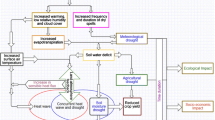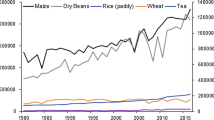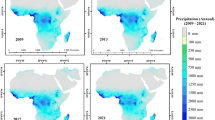Abstract
A large part of Brazil is highly vulnerable to climate changes projected for the end of the 21st century. Analyzing these vulnerabilities is particularly important for agriculture, since the country is one of the largest agricultural commodity producers in the world. Changes in the reference evapotranspiration (ETo) can impact crops and make cultivation unfeasible. However, studies on ETo patterns under climate change scenarios for Brazil have been restricted to regional scales and use too few climate models or too simplified water balance models for their analysis. This can lead to uncertainties in assessing the impacts of climate change on ETo. Therefore, this study seeks to analyze ETo patterns in Brazil towards the end of the 21st century using two methods that are better at estimating regional ETo, i.e., the Turc and Abtew methods, under two radiative forcing scenarios (RCPs 4.5 and 8.5). Daily data on near-surface air temperature (mean and maximum), global solar radiation, and near-surface relative humidity from six General Circulation Models (GCMs) from the Coupled Model Intercomparison Project Phase 5 (CMIP5) were used to analyze the simulations and projections for climate change. The performance of climate simulations is heterogeneous among the GCMs, with overestimations (~ 2.5 mm day− 1) in some models, and underestimations (~ 1.5 mm day− 1) in others. In general, climate change projections indicate increases of up to 1 mm day− 1 in ETo, mainly in the North, Northeast, and Center-West regions of Brazil. Both estimation methods showed similar spatial patterns, however the Turc method projected lower intensity changes compared to the Abtew method.
Highlights
The Turc method showed the best performance in estimating ETo, resulting in more reliable climate simulation and projections.
There was divergence between climate models when simulating solar radiation and relative humidity.
Climate models projected an increase in temperature (mean and maximum), and a reduction in relative humidity towards the end of the 21st century.
The projected ETo showed similar patterns between the Turc and Abtew methods.
Increases from 0.4 to 1 mm day− 1 are projected for ETo in the North, Northeast, and Center-West of Brazil, and from 0.2 to 0.4 mm day− 1 in the South of Brazil.






Similar content being viewed by others
Data availability
The data used in the article will be fully available, in order to contribute to transparency. If was necessary, all data used to support the findings of this study are available from the corresponding author upon reasonable request.
References
Abreu MC, Soares AAV, Freitas CH, Martins FB (2022) Transpiration and growth responses by Eucalyptus species to progressive soil drying. Int J Res. https://doi.org/10.1007/s11676-021-01448-z
Abtew W (1996) Evapotranspiration measurements and modeling for three wetland systems in South Florida. Water Resour Bull 32:465–473. https://doi.org/10.1111/j.1752-1688.1996.tb04044.x
Allen RG, Pereira LS, Raes D, Smith M (1998) Crop evapotranspiration: guidelines for computing crop water requirements. 1st edition. FAO Irrigation and Drainage Paper No. 56. FAO, Rome, Italy, 300 pp
Andrade CWL, Montenegro SMGL, Montenegro AAA, Lima JRS, Srinivasan R, Jones CA (2020) Climate change impact assessment on water resources under RCP scenarios: a case study in Mundaú River Basin, Northeastern Brazil. Int J Climatol 2020:1–17. https://doi.org/10.1002/joc.6751
Avila-Diaz A, Benezoli V, Justino F, Torres R, Wilson A (2020a) Assessing current and future trends of climate extremes across Brazil based on reanalysis and earth system model projections. Clim Dyn 55:1403–1426. https://doi.org/10.1007/s00382-020-05333-z
Avila-Diaz A, Abrahão G, Justino F, Torres R, Wilson A (2020b) Extreme climate indices in Brazil: evaluation of downscaled earth system models at high horizontal resolution. Clim Dyn 54:5065–5088. https://doi.org/10.1007/s00382-020-05272-9
Cardoso GM, Justino F (2014) Use of a regional model of climate-vegetation for estimating the componentes of the reference evapotranspiration under current and future climatic conditions of global warming. Rev Bras Meteorol 29:85–95. https://doi.org/10.1590/S0102-77862014000100009
Cerón WL, Kayano MT, Andreoli RV, Avila-Diaz A, Ayes I, Freitas ED, Martins JA, Souza RAF (2021) Recent intensification of extreme precipitation events in the La Plata Basin in Southern South America (1981–2018). Atmos Res 249:105299. https://doi.org/10.1016/j.atmosres.2020.105299
Darela JP, Lapola D, Torres RR, Lemos MC (2016) Socio-climatic hotspots in Brazil: how do changes driven by the new set of IPCC climatic projections affect their relevance for policy? Clim Change 136:413–425. https://doi.org/10.1007/s10584-016-1635-z
de Medeiros FJ, de Oliveira CP, Torres RR (2020) Climatic aspects and vertical structure circulation associated with the severe drought in Northeast Brazil (2012–2016). Clim Dyn 55:2327–2341. https://doi.org/10.1007/s00382-020-05385-1
Devi MJ, Reddy VR (2018) Transpiration response of cotton to vapor pressure deficit and its relationship with stomatal traits. Front Plant Sci 9:1572. https://doi.org/10.3389/fpls.2018.01572
Dewes CF, Rangwala I, Barsugli JJ, Hobbins MT, Kumar S (2017) Drought risk assessment under climate change is sensitive to methodological choices for the estimation of evaporative demand. PLoS ONE 12:1–22. https://doi.org/10.1371/journal.pone.0174045
Di Giulio GM, Torres RR, Lapola DM, Bedran-Martins AM, da Penha Vasconcellos M, Braga DR, Fuck MP, Juk Y, Nogueira V, Penna AC, Jacaúna T, Fetz M, Pessoa Z, Pontes R, Schons M, Premebida A (2019) Bridging the gap between will and action on climate change adaptation in large cities in Brazil. Reg Environ Change 19:2491–2502. https://doi.org/10.1007/s10113-019-01570-z
Elli EF, Sentelhas PC, Bender FB (2020) Impacts and uncertainties of climate change projections on Eucalyptus plantations productivity across Brazil. For Ecol Manag 474:1–11. https://doi.org/10.1016/j.foreco.2020.118365
Eyring V, Bony S, Meehl GA, Senior CA, Stevens B, Stouffer RJ, Taylor KE (2016) Overview of the coupled model Intercomparison Project Phase 6 (CMIP6) experimental design and organization. Geosci Model Dev 9:1937–1958. https://doi.org/10.5194/gmd-9-1937-2016
Fan J, Wu L, Zhang F, Xiang Y, Zheng J (2016) Climate change effects on reference crop evapotranspiration across different climatic zones of China during 1956–2015. J Hydrol 542:923–937. https://doi.org/10.1016/j.jhydrol.2016.09.060
Fraga H, Pinto JG, Santos JA (2019) Climate change projections for chilling and heat forcing conditions in European vineyards and olive orchards: a multi-model assessment. Clim Change 152:179–193. https://doi.org/10.1007/s10584-018-2337-5
Gao Z, He J, Dong K, Li X (2017) Trends in reference evapotranspiration and their causative factors in the West Liao River basin, China. Agric Meteorol 232:106–117. https://doi.org/10.1016/j.agrformet.2016.08.006
Gondim R, Silveira C, Souza Filho F, Vasconcelos Júnior F, Cid D (2018) Climate change impacts on water demand and availability using CMIP5 models in the Jaguaribe basin, semi-arid Brazil. Environ Earth Sci 77:1–14. https://doi.org/10.1007/s12665-018-7723-9
Guimarães SO, Costa AA, Vasconcelos Júnior FC, Silva EM, Sales DC, Araújo Júnior LM, Souza SM (2016) Climate change projections over the Brazilian northeast of the CMIP5 and CORDEX models. Rev Bras Meteorol 31:337–364. https://doi.org/10.1590/0102-778631320150150
Heinemann AB, Ramirez-Villegas J, Stone LF, Didonet AD (2017) Climate change determined drought stress profiles in rainfed common bean production systems in Brazil. Agric Meteorol 246:64–77. https://doi.org/10.1016/j.agrformet.2017.06.005
IPCC. Intergovernmental Panel on Climate Change (2013) - Summary for Policymaker. In: Stocker TF, Qin D, Plattner GK, Tignor M, Allen SK, Boschung J, Nauels A, Xia Y, Bex V, Midgley PM (eds) Climate Change 2013: the physical science basis. Contribution of Working Group I to the Fifth Assessment Report of the Intergovernmental Panel on Climate Change. Cambridge University Press, Cambridge, United Kingdom and New York, NY, USA
IPCC. Intergovernmental Panel on Climate Change (2021) – Summary for Policymaker. In: Masson-Delmotte VP, Zhai A, Pirani SL, Connors C, Péan S, Berger N, Caud Y, Chen L, Goldfarb MI, Gomis M, Huang K, Leitzell E, Lonnoy JBR, Matthews TK, Maycock T, Waterfield O, Yelekçi RY, Zhou B (eds) Climate Change 2021: the physical science basis. Contribution of Working Group I to the Sixth Assessment Report of the Intergovernmental Panel on Climate Change. Cambridge University Press, Cambridge, United Kingdom and New York, NY, USA
Jerszurki D, Souza JLM, Silva LCR (2019) Sensitivity of ASCE-Penman-Monteith reference evapotranspiration under different climate types in Brazil. Clim Dyn 53:943–956. https://doi.org/10.1007/s00382-019-04619-1
Lapola DM, Silva JMC, Braga DR, Carpigiani L, Ogawa F, Torres RR, Barbosa LCF, Ometto JPHB, Joly CA (2020) A climate-change vulnerability and adaptation assessment for Brazil’s protected areas. Conserv Biol 34:427–437. https://doi.org/10.1111/cobi.13405
Lemos Filho LAC, Carvalho LG, Evangelista AWP, Alves Júnior J (2010) Spatial analysis of the influence of Meteorological elements on the reference evapotranspiration in the state of Minas Gerais, Brazil. Rev Bras Eng Agríc Ambient 14:1294–1303. https://doi.org/10.1590/S1415-43662010001200007
Lin P, He Z, Du J, Chen L, Zhu X, Li J (2018) Impacts of climate change on reference evapotranspiration in the Qilian Mountains of China: historical trends and projected changes. Int J Climatol 38:2980–2993. https://doi.org/10.1002/joc.5477
Liu Q, Yan C, Ju H, Garré S (2018) Impact of climate change on potential evapotranspiration under a historical and future climate scenario in the Huang-Huai-Hai Plain, China. Theor Appl Climatol 132:387–401. https://doi.org/10.1007/s00704-017-2060-6
Llopart M, Reboita MS, Rocha RP (2020) Assessment of multi-model climate projections of water resources over South America CORDEX domain. Clim Dyn 54:99–116. https://doi.org/10.1007/s00382-019-04990-z
Lyra A, Tavares P, Chou SC, Sueiro G, Dereezynski C, Sondermann M, Silva A, Marengo J, Giarolla A (2017) Climate change projections over three metropolitan regions in Southeast Brazil using the non-hydrostatic Eta regional climate model at 5-km resolution. Theor Appl Climatol 132:663–682. https://doi.org/10.1007/s00704-017-2067-z
Martins FB, Benassi RB, Torres RR, Brito Neto FA (2022) Impacts of 1.5° C and 2° C global warming on Eucalyptus plantations in South America. Sci Total Environ 825:153820. https://doi.org/10.1016/j.scitotenv.2022.153820
Monteiro AFM, Martins FB, Torres RR, Almeida VHM, Abreu MC, Mattos EV (2021) Intercomparison and uncertainty assessment of methods for estimating evapotranspiration using a high-resolution gridded weather dataset over Brazil. Theor Appl Climatol 146:583–597. https://doi.org/10.1007/s00704-021-03747-1
Moses O, Hambira WL (2018) Effects of climate change on evapotranspiration over the Okavango Delta water resources. Phys Chem Earth 105:98–103. https://doi.org/10.1016/j.pce.2018.03.011
Moss RH, Edmonds JA, Hibbard KA, Manning MR, Rose SK, Van Vuuren DP, Carter TR, Emori S, Kainuma M, Kram T, Meehl GA, Mitchell JFB, Nakicenovic N, Riahi K, Smith SJ, Stouffer RJ, Thomson A, Weyant JP, Willbanks TJ (2010) The next generation of scenarios for climate change research and assessment. Nature 463:747–756. https://doi.org/10.1038/nature08823
Natividade UA, Garcia SM, Torres RR (2017) Trend of observed and projected extreme climate indices in Minas Gerais State. Rev Bras Meteorol 32:600–614. https://doi.org/10.1590/0102-7786324008
Pan S, Tian H, Dangal SRS, Yang Q, Yang J, Lu C, Tao B, Ren W, Ouyang Z (2015) Responses of global terrestrial evapotranspiration to climate change and increasing atmospheric CO2 in the 21st century. Earth’s Future 3:15–35. https://doi.org/10.1002/2014EF000263
Porfirio LL, Newth D, Finnigan JJ, Cai Y (2018) Economic shifts in agricultural production and trade due to climate change. Palgrave Commun 4:1–9. https://doi.org/10.1057/s41599-018-0164-y
Ramirez-Cabral NYZ, Kumar L, Shabani F (2017) Global alterations in areas of suitability for maize production from climate change and using a mechanistic species distribution model (CLIMEX). Sci Rep 7:1–13. https://doi.org/10.1038/s41598-017-05804-0
Regoto P, Dereczynski C, Chou SC, Bazzanela AC (2021) Observed changes in air temperature and precipitation extremes over Brazil. Int J Climatol 41:5125–5142. https://doi.org/10.1002/joc.7119
Ribeiro AF, Martins FB, Santos DF, Torres RR, Fagundes FFA (2024) Suitable areas for temperate fruit trees in a Brazilian hotspot area: changes driven by new IPCC scenarios. Eur J Agron 155:127110. https://doi.org/10.1016/j.eja.2024.127110
Ruosteenoja K, Markkanen T, Venalainen A, Raisanen P, Peltola H (2018) Seasonal soil moisture and drought occurrence in Europe in CMIP5 projections for the 21st century. Clim Dyn 50:1177–1192. https://doi.org/10.1007/s00382-017-3671-4
Santos DF, Martins FB, Torres RR (2017) Impacts of climate projections on water balance and implications on olive crop in Minas Gerais. Ver Bras Eng Agríc Ambient 21:77–88. https://doi.org/10.1590/1807-1929/agriambi.v21n2p77-82
Santos LC, José JV, Bender FD, Alves DS, Nitsche PR, Reis EF, Coelho RD (2019) Climate change in the Paraná state, Brazil: responses to increasing atmospheric CO2 in reference evapotranspiration. Theor Appl Climatol 140:55–68. https://doi.org/10.1007/s00704-019-03057-7
Silva JMC, Rapini A, Barbosa LCF, Torres RR (2019) Extinction risk of narrowly distributed species of plants in Brazil due to habitat loss and climate change. PeerJ 7:e7333. https://doi.org/10.7717/peerj.7333
Sousa RM, Viola MR, Chou SC, Alves MVG, Avanzi JC (2019) Downscaled climate projections over Tocantins State, Brazil, under RCP 4.5 and RCP 8.5 scenarios. Rev Bras Climatol 24:330–347. https://doi.org/10.5380/abclima.v24i0.57052
Tavares PS, Giarolla A, Chou SC, Silva AJP, Lyra AA (2018) Climate change impact on the potential yield of Arabica coffee in southeast Brazil. Reg Environ Change 18:873–883. https://doi.org/10.1007/s10113-017-1236-z
Tironi LF, Streck NA, Santos ATL, Freitas CPO, Ferraz SET (2017) Estimating cassava yield in future IPCC scenarios for the Rio Grande do Sul State, Brazil. Cienc Rural 47:1–10. https://doi.org/10.1590/0103-8478cr20160315
Torres RR, Marengo JA (2014) Climate change hotspots over South America: from CMIP3 to CMIP5 multi-model datasets. Theor Appl Climatol 117:579–587. https://doi.org/10.1007/s00704-013-1030-x
Torres RR, Lapola DM, Marengo JA, Lombardo MA (2012) Socio-climatic hotspots in Brazil. Clim Change 115:597–609. https://doi.org/10.1007/s10584-012-0461-1
Torres RR, Benassi RB, Martins FB, Lapola DM (2021) Projected impacts of 1.5 and 2°C global warming on temperature and precipitation patterns in South America. Int J Climatol. https://doi.org/10.1002/joc.7322
Valipour M, Sefidkouhi MAG, Raeini-Sarjaz M (2017) Selecting the best model to estimate potential evapotranspiration with respect to climate change and magnitudes of extreme events. Agric Water Manag 180:50–60. https://doi.org/10.1016/j.agwat.2016.08.025
Van Vuuren DP, Edmonds J, Kainuma M, Riahi K, Thomson A, Hibbard K, Hurtt GC, Kram T, Kret V, Lamarque JF, Mausi T, Meinshausen M, Nakicenovic N, Smith SJ, Rose SK (2011) The representative concentration pathways: an overview. Clim Change 109:5–31. https://doi.org/10.1007/s10584-011-0148-z
Wang Y, Jiang T, Bothe O, Fraedrich K (2007) Changes of pan evaporation and reference evapotranspiration in the Yangtze River basin. Theor Appl Climatol 90:13–23. https://doi.org/10.1007/s00704-006-0276-y
Wang J, Liu X, Cheng K, Zhang X, Li L, Pan G (2018) Winter wheat water requirement and utilization efficiency under simulated climate change conditions: a Penman-Monteith model evaluation. Agric Water Manag 197:100–109. https://doi.org/10.1016/j.agwat.2017.11.015
Xavier AC, King CW, Scanlon BR (2016) Daily gridded meteorological variables in Brazil (1980–2013). Int J Climatol 36:2644–2659. https://doi.org/10.1002/joc.4518
Zhang KX, Pan SM, Zhang W, Xu YH, Cao LG (2015) Influence of climate change on reference evapotranspiration and aridity index and their temporal-spatial variations in the Yellow River Basin, China, from 1961 to 2012. Quat Int 380:75–82. https://doi.org/10.1016/j.quaint.2014.12.037
Acknowledgements
The authors would like to thank the Minas Gerais Research Support Foundation (FAPEMIG) for financially supporting projects, and for granting scholarships to the 1st author (FAPEMIG process number ID-13748–5.304/15), and to also thank the Coordination for the Improvement of Higher Education Personnel (CAPES, process numbers 1780316 and 88882.430051/2019-01), for granting scholarships to the 1st and 4th authors, and the National Council for Scientific and Technological Development (CNPq, process numbers 309215/2021-8 and 306845/2021-0) for the research fellowship granted to the 2nd and 3rd authors. The authors also thank Ph.D. Alexandre Cândido Xavier for making available the observed spatialized data on the Brazilian territory, and the Natural Resources Institute of Universidade Federal de Itajubá for providing subsidies to the publication of this article.
Funding
Financial support was received from Minas Gerais Research Support Foundation (FAPEMIG) for granting scholarships to the 1st author (FAPEMIG process number ID-13748–5.304/15), from Coordination for the Improvement of Higher Education Personnel (CAPES, process numbers 1780316 and 88882.430051/2019-01) for granting scholarships to the 1st and 4th authors, and from the National Council for Scientific and Technological Development (CNPq, process numbers 309215/2021-8 and 306845/2021-0) for the research fellowship granted to the 2nd and 3rd authors.
Author information
Authors and Affiliations
Contributions
Monteiro, A. F. M.: Conceptualization, Design of methodology, Data acquisition, Data analysis, Writing and editing, Data curation, Software. Torres, R. R.: Conceptualization, Design of methodology, Data analysis, Writing, review and editing, Supervision, Project administration, Founding acquisition. Martins, F. B.: Conceptualization, Design of methodology, Data analysis, Writing, review and editing, Supervision, Project administration, Founding acquisition. Marrafon, V. H. de. A.: Data analysis, Data curation, Software.
Corresponding author
Ethics declarations
Ethical approval
Not applicable.
Conflicts of interest
The authors have no relevant financial or non-financial interests to disclose.
Additional information
Publisher’s Note
Springer Nature remains neutral with regard to jurisdictional claims in published maps and institutional affiliations.
Electronic supplementary material
Below is the link to the electronic supplementary material.
Rights and permissions
Springer Nature or its licensor (e.g. a society or other partner) holds exclusive rights to this article under a publishing agreement with the author(s) or other rightsholder(s); author self-archiving of the accepted manuscript version of this article is solely governed by the terms of such publishing agreement and applicable law.
About this article
Cite this article
Monteiro, A.F.M., Torres, R.R., Martins, F.B. et al. Climate change impacts on evapotranspiration in Brazil: a multi-model assessment. Theor Appl Climatol (2024). https://doi.org/10.1007/s00704-024-04942-6
Received:
Accepted:
Published:
DOI: https://doi.org/10.1007/s00704-024-04942-6




